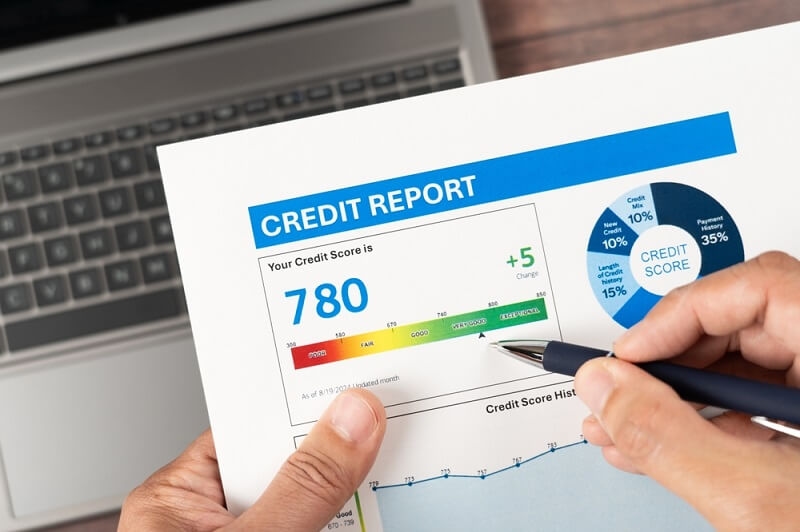
Monitoring your finances begins with the single most essential step—reviewing your credit report. Whether it's for a loan application, new apartment rental, or evaluating your financial wellness, it's essential to understand what your credit looks like. You will learn about aspects of your credit report, including your credit history, any potential errors, and the overall impression lenders and creditors may have regarding your creditworthiness.
In this guide, you will learn how to check your credit report for free, where to obtain your free annual credit report, and how to approach your credit report errors before they impact your score or your next financial decision.
With regards to financial health, viewing a credit report is similar to going for a regular checkup. It makes you aware of your financial situation and identifies issues before they develop into major problems.
Your credit report is the basis of many financial decisions—loan approval, interest rates, insurance premiums, and sometimes even job applications. By reviewing your credit history regularly, you can confirm the information that lenders, credit card issuers, and financial institutions have provided is, in fact, correct.
By building the habit of credit report checking, you can secure yourself from identity theft, unauthorized credit accounts, and false information that may damage your credit score.
People often ask how to check a credit report for free without getting into scams and surprise fees. Fortunately, U.S. consumers are legally allowed one free credit report annually from all three major credit agencies: Equifax, Experian, and TransUnion.
You can obtain your free annual credit report via the government-approved site — AnnualCreditReport.com
This is the sole government-approved site to obtain free credit reports, keeping your personal information safe.
You can choose to obtain all three services at once or space them out throughout the year to manage checking your credit more frequently.
By checking your credit regularly, you can identify issues before they develop, such as duplicate accounts, outdated addresses, or fraudulent activity.
Before you start checking your credit history, it is important for you to understand what your report contains. A credit report has a lot of details regarding your financial behavior. It details your credit card account holders, loans you may have, and payment records.
Reviewing your credit history will give you insights into how lenders view your reliability and how your behavior impacts your credit score. If your history reports anything unusual, this could indicate a mistake in your credit report and/or fraudulent activity.

Catching errors early can prevent significant financial harm. Upon reviewing their credit report, the majority of consumers will find mistakes—misstated balances, inaccurate personal information, or accounts that don't belong to them at all.
Most prevalent errors on your credit report include the following:
Reviewing your annual credit report and credit history carefully can help you identify these issues early. The earlier you dispute a mistake, the quicker it will be resolved.
If you find credit report errors, take action. The Fair Credit Reporting Act (FCRA) grants you the right to dispute information on your credit file that is inaccurate or outdated.
Due to an error in the credit report, there is incorrect information being reported. If the dispute is unsubstantiated, it can hurt your credit report. It is advisable to check your credit report regularly to ensure that any errors have been corrected, which can help protect your credit. You may also contact the creditor directly to expedite the process of fixing the error.
Apart from AnnualCreditReport.com, you can also review your credit reports more often using one of several trusted services. If you would like to know where you can get updates to your credit reports throughout the year (besides the one free credit report through AnnualCreditReport.com), here are several trusted options.
Multiple entry points enable you to stay ahead and detect suspicious transactions in a timely manner.
Checking your credit history isn’t always about checking for errors. It’s also an excellent way to learn about your financial patterns. When looking at how you handle debt, repay loans, or charge credit cards, you should be able to formulate plans to improve your credit score and financial standing.
Personal finance experts recommend reviewing your credit report at least three times a year, but more effectively if you receive a report from each credit reporting agency. This will provide a comprehensive review of your credit health.
Though the legislation permits one free report per bureau per year, this does not mean you may only check once a year. Some consumers prefer to alternate their reports—Equifax in January, Experian in May, and TransUnion in September—to monitor changes on an ongoing basis.
Regularly checking your credit report keeps you informed of any abrupt score declines or newly opened accounts you didn't create. Even if your credit appears to be in order, checking your credit history quarterly helps keep your files clean and current.
Your credit report is more than a report—it's your identity when it comes to money. When lenders, landlords, or employers review your credit, they consider you to be irresponsible and untrustworthy.
Consistent reviewing of your credit history ensures your record accurately represents you. Errors or information that is no longer valid can cause you to pay higher interest rates on loans and credit cards, have loan applications turned down, or lose job opportunities.
If you steer clear of problems and regularly review your credit report, you can create a better report that is helpful to you in keeping your long-term financial reputation intact.
After you have received and reviewed your credit report and addressed any issues that required your attention, your next goal is to maintain a responsible credit history.
Here are some tips for keeping your credit report healthy and looking appealing to lenders:
If you maintain these habits, you won't just keep your credit report accurate and updated, but you will also be building your financial credibility in the long run.
One of the most significant reasons to regularly monitor your credit report is to be vigilant against identity theft.
Hackers can steal information and use it to open new accounts under your name, leaving you liable for charges you did not make.
Indicators of Identity Theft:
If you notice suspicious behavior while checking your credit history, lock your credit report right away and report the fraud to the Federal Trade Commission (FTC).
Financial empowerment begins with knowledge. Monitoring your credit report regularly makes you the master of your financial story. If you are correcting credit report mistakes, accessing your free annual credit report, or understanding how to check your credit report for free, then you're in charge of your financial future.
A reliable credit report means an easier, more manageable experience with loans and better interest rates. Establish good credit reporting habits in your personal finances today because today's knowledge of how credit affects you is tomorrow's economic security.
This content was created by AI